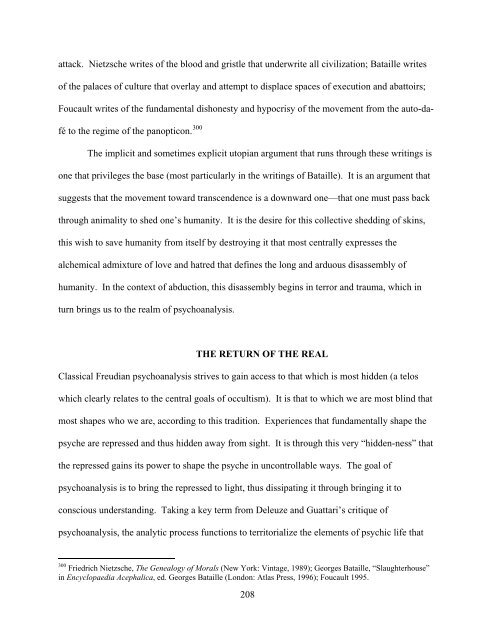A Genealogy of the Extraterrestrial in American Culture
A Genealogy of the Extraterrestrial in American Culture
A Genealogy of the Extraterrestrial in American Culture
Create successful ePaper yourself
Turn your PDF publications into a flip-book with our unique Google optimized e-Paper software.
attack. Nietzsche writes <strong>of</strong> <strong>the</strong> blood and gristle that underwrite all civilization; Bataille writes<br />
<strong>of</strong> <strong>the</strong> palaces <strong>of</strong> culture that overlay and attempt to displace spaces <strong>of</strong> execution and abattoirs;<br />
Foucault writes <strong>of</strong> <strong>the</strong> fundamental dishonesty and hypocrisy <strong>of</strong> <strong>the</strong> movement from <strong>the</strong> auto-dafé<br />
to <strong>the</strong> regime <strong>of</strong> <strong>the</strong> panopticon. 300<br />
The implicit and sometimes explicit utopian argument that runs through <strong>the</strong>se writ<strong>in</strong>gs is<br />
one that privileges <strong>the</strong> base (most particularly <strong>in</strong> <strong>the</strong> writ<strong>in</strong>gs <strong>of</strong> Bataille). It is an argument that<br />
suggests that <strong>the</strong> movement toward transcendence is a downward one—that one must pass back<br />
through animality to shed one’s humanity. It is <strong>the</strong> desire for this collective shedd<strong>in</strong>g <strong>of</strong> sk<strong>in</strong>s,<br />
this wish to save humanity from itself by destroy<strong>in</strong>g it that most centrally expresses <strong>the</strong><br />
alchemical admixture <strong>of</strong> love and hatred that def<strong>in</strong>es <strong>the</strong> long and arduous disassembly <strong>of</strong><br />
humanity. In <strong>the</strong> context <strong>of</strong> abduction, this disassembly beg<strong>in</strong>s <strong>in</strong> terror and trauma, which <strong>in</strong><br />
turn br<strong>in</strong>gs us to <strong>the</strong> realm <strong>of</strong> psychoanalysis.<br />
THE RETURN OF THE REAL<br />
Classical Freudian psychoanalysis strives to ga<strong>in</strong> access to that which is most hidden (a telos<br />
which clearly relates to <strong>the</strong> central goals <strong>of</strong> occultism). It is that to which we are most bl<strong>in</strong>d that<br />
most shapes who we are, accord<strong>in</strong>g to this tradition. Experiences that fundamentally shape <strong>the</strong><br />
psyche are repressed and thus hidden away from sight. It is through this very “hidden-ness” that<br />
<strong>the</strong> repressed ga<strong>in</strong>s its power to shape <strong>the</strong> psyche <strong>in</strong> uncontrollable ways. The goal <strong>of</strong><br />
psychoanalysis is to br<strong>in</strong>g <strong>the</strong> repressed to light, thus dissipat<strong>in</strong>g it through br<strong>in</strong>g<strong>in</strong>g it to<br />
conscious understand<strong>in</strong>g. Tak<strong>in</strong>g a key term from Deleuze and Guattari’s critique <strong>of</strong><br />
psychoanalysis, <strong>the</strong> analytic process functions to territorialize <strong>the</strong> elements <strong>of</strong> psychic life that<br />
300 Friedrich Nietzsche, The <strong>Genealogy</strong> <strong>of</strong> Morals (New York: V<strong>in</strong>tage, 1989); Georges Bataille, “Slaughterhouse”<br />
<strong>in</strong> Encyclopaedia Acephalica, ed. Georges Bataille (London: Atlas Press, 1996); Foucault 1995.<br />
208















